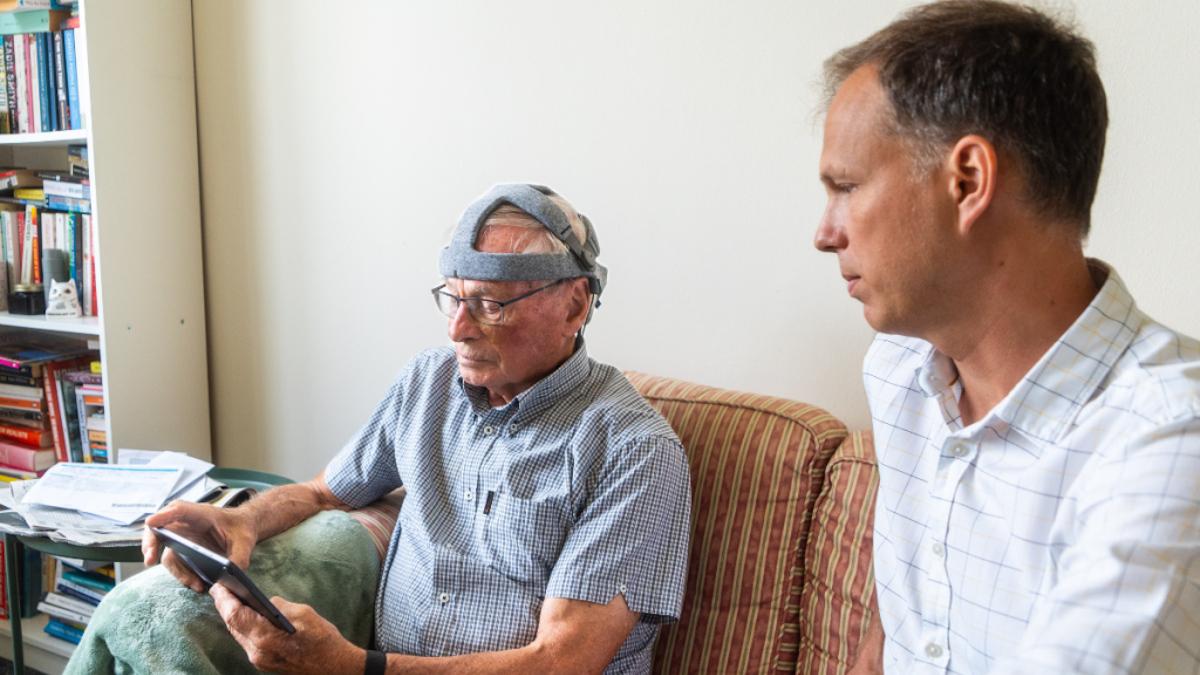Health
New Test Offers Hope for Early Detection of Dementia

A groundbreaking test known as the Fastball test has emerged as a potential tool for diagnosing individuals at risk of developing dementia. Researchers from the UK have found that this three-minute test can detect signs of cognitive decline years before traditional diagnostic methods.
The Fastball test involves participants wearing an electroencephalogram (EEG) headset while they remember a series of images displayed on a screen. The test analyzes how well the brain can differentiate between images based on prior exposure. Dr. George Stothart, a cognitive neuroscientist at the University of Bath, led a small clinical study in collaboration with the University of Bristol, which indicates that the Fastball test can reliably identify memory problems in individuals with mild cognitive impairment (MCI) that often precedes Alzheimer’s disease.
The study, published in the journal Brain Communications and funded by BRACE Dementia Research, involved 107 participants. This included 33 individuals with memory deficits, 20 with other cognitive impairments, and 54 healthy controls. Researchers discovered that subjects diagnosed with amnestic MCI, a condition that primarily affects memory, showed significantly diminished responses to the test compared to both healthy adults and those with non-amnestic MCI.
Given that individuals with amnestic MCI have a much higher likelihood of progressing to Alzheimer’s, the researchers believe that early detection through the Fastball test could facilitate timely interventions. This could be particularly important as new treatments, including Eisai/Biogen’s Leqembi (lecanemab) and Eli Lilly’s Kisunla (donanemab), which target amyloid plaques associated with the disease, become available.
“We’re missing the first 10 to 20 years of Alzheimer’s with current diagnostic tools,” stated Dr. Stothart. “Fastball offers a way to change that – detecting memory decline far earlier and more objectively, using a quick and passive test.”
While the authors of the study acknowledge that further testing is necessary before the Fastball test can be routinely implemented in healthcare settings, they see its potential for broader screening and monitoring. This could enable its use in general practitioner surgeries, memory clinics, or even at home.
Prof. Vladimir Litvak from the UCL Queen Square Institute of Neurology, who did not participate in the study, noted the significance of the findings but emphasized that more validation is required. “The study found a clear difference in EEG responses between patients with and without amnesia. However, the ability to classify individual patients using this effect, including estimates of error rates, was not assessed,” Litvak explained. He added that all participants tested were already symptomatic, highlighting the need for a prospective study to determine whether the Fastball test can accurately predict an individual’s clinical trajectory and support patient stratification for treatment.
Earlier this year, the U.S. Food and Drug Administration approved the first blood test to aid in diagnosing Alzheimer’s disease, which has reportedly led to increased usage of anti-amyloid therapies. Other innovative approaches for detecting individuals at risk for dementia include artificial intelligence-powered eye examinations, virtual reality navigation assessments, and tests based on various cognitive and behavioral patterns.
As researchers continue to explore early diagnosis methods, the Fastball test represents a significant step toward enhancing the capacity for timely intervention in dementia care, promising a future where early detection may lead to improved outcomes for those at risk.
-

 Health3 months ago
Health3 months agoNeurologist Warns Excessive Use of Supplements Can Harm Brain
-

 Health3 months ago
Health3 months agoFiona Phillips’ Husband Shares Heartfelt Update on Her Alzheimer’s Journey
-

 Science1 month ago
Science1 month agoBrian Cox Addresses Claims of Alien Probe in 3I/ATLAS Discovery
-

 Science1 month ago
Science1 month agoNASA Investigates Unusual Comet 3I/ATLAS; New Findings Emerge
-

 Science4 weeks ago
Science4 weeks agoScientists Examine 3I/ATLAS: Alien Artifact or Cosmic Oddity?
-

 Entertainment4 months ago
Entertainment4 months agoKerry Katona Discusses Future Baby Plans and Brian McFadden’s Wedding
-

 Science4 weeks ago
Science4 weeks agoNASA Investigates Speedy Object 3I/ATLAS, Sparking Speculation
-

 Entertainment4 months ago
Entertainment4 months agoEmmerdale Faces Tension as Dylan and April’s Lives Hang in the Balance
-

 World3 months ago
World3 months agoCole Palmer’s Cryptic Message to Kobbie Mainoo Following Loan Talks
-

 Science4 weeks ago
Science4 weeks agoNASA Scientists Explore Origins of 3I/ATLAS, a Fast-Moving Visitor
-

 Entertainment4 months ago
Entertainment4 months agoLove Island Star Toni Laite’s Mother Expresses Disappointment Over Coupling Decision
-

 Entertainment3 months ago
Entertainment3 months agoMajor Cast Changes at Coronation Street: Exits and Returns in 2025









